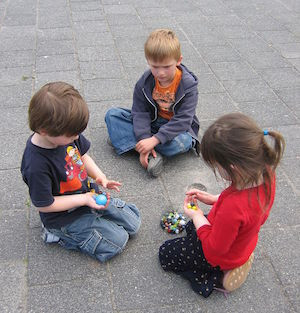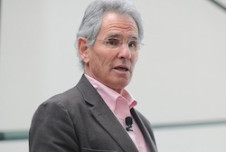More than a decade after Greater Good first started reporting on the science of compassion, generosity, happiness—what we call “the science of a meaningful life”—the research in our field is acquiring ever more nuance and sophistication. New studies build on and even re-interpret findings from previous years, particularly as their authors use more exacting methods, with bigger and broader data sets, and consider additional factors to explain prior results.
These nuances are clearly reflected in this year’s list of our Top 10 Insights from the Science of a Meaningful Life—the fourth such list compiled by Greater Good’s editors. Indeed, many of this year’s entries could be described as “Yes, but” insights: Yes, as prior findings suggest, being wealthy seems to make people less generous, but only when they reside in places with high inequality. Yes, pursuing happiness makes you unhappy, but only if you live in an individualistic culture. Yes, Americans are less happy than they used to be, but only if they’re over the age of 30. The caveats and qualifications abound.
And these are not just signs of academic hair splitting. Instead, they demonstrate that researchers are sharpening their understanding of the actual causes, consequences, and current state of humans’ social and emotional well-being. And that, in turn, means that Greater Good is able to report on the practical implications and potential applications of this research with greater confidence and precision than ever before.
To do that, of course, we rely on a brain trust of some excellent guides and advisors. In addition to our staff and faculty here at UC Berkeley’s Greater Good Science Center, we polled more than 150 outside experts in our field, asking them to identify the findings from 2015 that they considered most novel, provocative, profound, and (potentially) enduring from the science of a meaningful life. From the scores of nominations that we received, it was challenging to whittle the list down to 10, as it always is. But after much discussion and debate, here are our top choices.
Experiencing awe makes us, well, awesome.
 © Allie_Caulfield from Germany
© Allie_Caulfield from Germany
Before this year, there were just a handful of studies ever published about the experience of awe. It was one of those emotions—like gratitude and happiness before it—that had been neglected as a topic worthy of serious scientific attention.
That started to change in a big way this year. Several studies published in 2015 suggest some profound, previously overlooked benefits associated with awe, which is defined by researchers as feeling like we’re in the presence of something larger than ourselves—be it a natural wonder, a work of art, or feats of athleticism or altruism—that defies our understanding of the world and makes us feel like we’re just one small part of a vast, interconnected universe.
Two studies in particular stood out. A paper published in April in the journal Emotion linked awe to special health benefits. The researchers found that people who experience high levels of positive emotions in general had significantly lower levels in their bodies of pro-inflammatory cytokines, which are proteins associated with type-2 diabetes, heart disease, Alzheimer’s, depression, and other health problems.
Closer analysis of the results revealed that awe was the emotion most strongly associated with lower levels of cytokines and thus better health. In fact, the more frequently participants reported feeling awe, the lower their cytokine levels.
A separate study, published in June in the Journal of Personality and Social Psychology, suggests that awe might not only boost our health but also make us more kind and helpful to others. In one part of the study, participants either gazed up at some towering eucalyptus trees, which induced feelings of awe, or stared up at a large building. When a passer-by (who was actually working with the researchers) “accidentally” dropped some pens in front of them, the people who had looked at the trees were significantly more likely to help pick the pens up.
Both of those studies were conducted by a team that included Greater Good Science Center Director Dacher Keltner, who has been a pioneer in the study of awe. As the field takes off and attracts more interest from other scientists, it’s likely that new awe findings will make this list in the future.
Cynicism can hurt your pocketbook.
Don’t be so trusting. Watch your back. You can’t be too careful. That’s the way to get ahead in life, right?
A paper published in May in the Journal of Personality and Social Psychology casts some doubt on that mentality.
In an analysis of more than 68,000 Americans and Europeans over nine years, researchers at the University of Cologne in Germany found that cynicism isn’t the path to financial success. If you are wary of trusting others, worry about being taken advantage of, and see others as self-interested and deceitful, you’re likely to have a lower income now (and in the future) than people with a rosier view of humanity.
There was just one exception: Cynicism is less financially detrimental in countries where it seems justified—where the murder rate is high, the giving rate is low, and more people see each other as selfish and predatory. In a few countries, cynics actually earned slightly more money.
“Cynical individuals are likely to lack the ability (or willingness) to rely on others,” the researchers explain. That may be helpful in the roughest areas of the world, but not so helpful in civilized society, where they miss out on valuable opportunities attained by asking for help, making compromises, and collaborating.
In other words, if you’re a cynic among people who would be happy to offer help and support, you’re basically shooting yourself in the foot—a good reason to put a little faith in humanity.
We can bridge political divides by appealing to the other side’s moral values.
American political debates seem shaped by sides unwilling or unable to find common ground. Partisans sometimes feel intense frustration that the other side won’t buy their (clearly correct) point of view. However, research by Jonathan Haidt, Joshua Greene, and others has suggested that we often fail to recognize how moral systems undergird political divisions, and that this obliviousness may explain the intractability of today’s political climate.
In a study published this month in Personality and Social Psychology Bulletin, Matthew Feinberg and Robb Willer hypothesize that political advocates make arguments grounded in their own morality, not the values of those they want to persuade—which the researchers memorably describe as a “moral empathy gap.” They also wondered if arguments appealing to the moral values of those targeted for persuasion will be more effective.
To test these assumptions, they ran six studies. The first two asked 93 participants to write essays that try persuade the other side—the results of which did indeed confirm the hypothesis that both liberals and conservatives tend to write from their own moral foundations without, apparently, considering the morality of their opponents.
The next four studies tested the idea that re-framing political arguments in the moral terms of the other side would prove more persuasive. In the third study, for example, Feinberg and Willer presented 288 participants with arguments in favor of universal health care that invoked either the value of fairness (i.e., health care is a right for all) or the value of purity (i.e., sick people are disgusting and therefore we need to reduce sickness). This and similar studies did indeed confirm that arguing from moral foundations made a difference: Conservatives who heard the purity argument for Obamacare became friendlier toward it.
In addition to establishing more links between morality and politics, this paper reveals on an empirical level that efforts to bridge the moral empathy gap can pay off in persuasion. “Morality contributes to political polarization because moral convictions lead individuals to take absolutist stances and refuse to compromise,” conclude the authors. “Our research presents a means for political persuasion that, rather than challenging one’s moral values, incorporates them into the argument.” (Or, perhaps, advocates need to directly address the morality of opponents, instead of ignoring its importance to their political positions or bickering around specific policies.)
Will moral arguments be effective on every highly charged political issue—for instance, could they convince Bernie Sanders that a flat tax is a fair, sound fiscal policy? Or, of greater concern to people dismayed by anti-immigrant sentiment in the United States, could they persuade Donald Trump to welcome people to the U.S. who don’t look like him? Probably not. But they may influence enough of his supporters to make a difference. No matter what, it’s worth the time to try to put yourself in the shoes of political opponents.
Inequality—not wealth—is the enemy of generosity.
Some of Greater Good’s most popular and provocative articles over the past few years have reported on new research suggesting that people of higher socioeconomic status are less generous, less compassionate, and less empathic than others.
But this year, a new study offered a significant twist: The earlier research, it seems, may have told only part of an important and timely story.
According to the new study, published online in November in the Proceedings of the National Academy of Sciences (PNAS), higher-income people are less generous—but only when they live in a place that has high levels of inequality. When the gap between rich and poor is low, the rich might actually be more generous.
Those conclusions were based on data from a big national survey of United States residents that found that in states with greater inequality, people with higher incomes were less willing to share a prize with a stranger, but in states with low inequality, they more were willing. A subsequent experiment—where the researchers told people their state had high or low inequality—suggested that the rich become more selfish only when they believe that they live amidst great inequality. The researchers speculate that’s because great inequality impels the well-off to convince themselves that they truly deserve their good fortune and thus don’t need to share it.
Those findings echo the results from another recent study, published in October in Nature, in which researchers made an unequal distribution of resources among members of a group. The wealthier members were less likely to cooperate when the inequities were made visible; when they weren’t apparent, the rich weren’t less cooperative.
So why did previous studies suggest that the rich were unequivocally more selfish? One possible explanation: Many of those earlier studies were conducted in California, a state with some of the highest inequality in the country.
According to the PNAS study’s authors, their findings don’t contradict the prior research as much as offer a caveat to it. What’s more, says study co-author Robb Willer of Stanford University, their work offers more targeted prescriptions for public policy.
“If you’re concerned about the relationship between income and generosity,” he says, “one way to counteract that is to adopt policies that promote equality.”
Pursuing happiness makes you unhappy—but only if you live in an individualistic culture.

Americans want to be happy. But some recent studies have found a paradox: The pursuit of happiness tends to make individual Americans unhappy.
A new study sheds some light on this peculiar American contradiction, suggesting that the relationship between pursuing happiness and decreased well-being, far from being universal, may actually be a product of our individualistic culture.
Brett Ford, of the University of California, Berkeley, teamed up with researchers from around the world to look at the pursuit of happiness in four culturally-distinct locations: the United States, Germany, Russia, and East Asia. College undergraduates living in each location answered questionnaires measuring their psychological and physical well-being, their motivation to pursue happiness, and the extent to which they viewed happiness in social terms—meaning that, for them, happiness was linked to social engagement and helping others.
Ford and colleagues then analyzed the data to find out how these factors interacted with one another in different cultural settings. The results, published in the Journal of Experimental Psychology, showed that the pursuit of happiness did indeed lead to less well-being for Americans, a finding that replicates prior studies. This wasn’t the case elsewhere in the world.
The impact of culture on the pursuit of happiness seems to be related to the way different cultures view happiness, says Ford. In Russia and East Asia, study participants were shown to strongly equate happiness with social relationships—something Ford says is in line with their more “collectivist,” or group-oriented, cultures. In Germany and the United States this wasn’t the case, probably a result of their more “individualistic” orientation.
This suggests that in collectivist cultures, people seek social solutions for becoming happier, says Ford. Since social ties are well-known predictors of well-being, this may explain why happiness pursuers in Russia and East Asia tend to actually feel happier.
The upshot? Try to focus less intensely on your desire to be happy and just concentrate on building social relationships—hang out with friends and family, seek out social opportunities when possible, and develop practices like compassion and gratitude, which can make you feel more connected to others.
Older Americans are becoming less happy.
American society has undergone significant upheavals in the past few decades, from the invention of social media to the globalization of the economy. We have more money, bigger homes, and more education, but also greater inequality. Have all these changes made us happier?
Only some of us, suggests a study published this year in the journal Social Psychological and Personality Science. According to survey responses from 1.3 million people spanning 1972 to 2014, today’s American adolescents are happier than teens were in the past, but adults over age 30 have become less happy.
Note that this isn’t a longitudinal study, when researchers follow the same individuals over time; instead, this study compared the subjective well-being of specific age groups at different points in recent history. Previous studies have found that happiness jumps up and down over the course of individual lives, with most finding that happiness falls dramatically in middle age and then gently increases as we enter the senior years. By comparing age groups over time, Jean Twenge and her colleagues were able to detect social trends in happiness. Their results are echoed by a report this year from the Centers for Disease Control and Prevention, which showed that the suicide rate for Americans aged 35 to 64 years has jumped by 28 percent since 1999, while the rate for younger people has stayed steady.
These findings are important because they reveal a previously hidden problem, although the research hasn’t yet told us exactly why this shift is happening. Something about American cultural changes over the past 40 years seems to be hitting adults hard while buoying up adolescents, and the researchers can only speculate. One suspicion? We’re seeing a rise in individualism and a weakening of social ties that may be primarily harmful to adults. Many adults over 30 have moved through a stage of independence and exploration and now crave connection, but may have difficulty finding fulfilling relationships and communities.
If this is true, Americans have something to learn from other societies where social ties remain strong even in our modern age.
Good peer relationships are essential to adolescent wellness.

Social isolation hurts humans of all ages, but a new wave of studies published this year shows just how sensitive teens are to their social environment.
To start, a new longitudinal study in Psychological Science suggests that teens who have close friendships and follow their peer group grow up to be healthier than the loners, or those who only pursue self-interest. Even when taking into account other potential contributors to health outcomes, like adult drug use, friendship quality and group-focus in one’s early teens predicted health in one’s mid-20’s better than the combined effect of one’s body mass index or prior history of serious illness. “We had no idea how important peer relationships would be, or that their reach would spread as far as physical health,” says Joseph Allen, who is the principal investigator at the University of Virginia’s Adolescent Research Group.
Two other studies suggest why this might be the case.
One paper published in the journal Social Cognitive and Affective Neuroscience looked specifically at how social context relates to risk-taking in the teen brain. In a two-year study, researchers at the University of Illinois, Urbana-Champaign, and UCLA asked 46 teens to keep daily diaries about experiences with peer conflict and support. Researchers then scanned the brains of participants as they inflated a virtual balloon. How close participants take it to the point of explosion reveals their attitudes toward risk; previous studies have found this task correlates “with real-life risk behaviors such as adolescent smoking, sexual promiscuity, addiction, and drug use, suggesting that this task provides a scanner-compatible proxy for measuring real-world behaviors.”
In analyzing the diaries in relation to the brain scans, researchers found that less support and more conflict with peers was associated with greater risk-taking behavior. Risk-taking teens showed greater activation in the ventral striatum, which has a large amount of dopamine receptors, and the insula, which is involved in sensing other people’s feelings as well as your own. While the implications of the neural findings aren’t yet entirely clear, this study reveals how critical teen friendships are to healthy choices.
It’s a finding echoed in another paper published in the Proceedings of the Royal Society B. After a research team from the University of Warwick analyzed interview and questionnaire data from the National Longitudinal Study of Adolescent to Adult Health, they concluded that a healthy mood spreads through teen social networks, but that depression did not—and, in fact, friendship could reduce both the frequency and depth of depression.
During adolescence, kids start to turn from their parents to their peers to find approval, values, and company. These studies reveal the circumstances in which that can be good or bad. “That desire to be like other people and look the part, that’s a built-in human desire,” says Allen. “We kind of pillory adolescents a bit unfairly for being overly focused on peers, not recognizing that as humans we need to get along and fit in, in order to get by.”
Happiness is contagious—via our sense of smell.

Wake up and smell the happiness! A study published in Psychological Science suggests that happy people give off an odor that makes others smile.
Scientists know that happiness is contagious: People with happy friends are more likely to become happy in the future, for example. Intuitively, this makes sense: In the company of happy people, we have more warm experiences and shared giggles. But could something else be going on? Previous research suggests that fear can be communicated via smell, so a group of European researchers decided to investigate this pathway.
In an exploratory study, the researchers collected sweat samples from male participants as they watched videos designed to elicit positive feelings, such as the “Bare Necessities” clip from the movie The Jungle Book and a comedic prank from a TV show. Sweat samples were also collected from participants who were made to feel afraid or no emotional response at all. All of the sweat samples were then presented to female participants to smell while their facial expressions were recorded.
When sniffing sweat from someone who felt happy, the women were more likely to exhibit an authentic smile. According to the researchers, this means that happy sweat may have a distinct chemical makeup that our noses pick up on.
This research sheds light on a subtle yet everyday way in which happiness can be communicated. It suggests that, by surrounding ourselves with happier people (and their scents), we could bring more positive emotion into our lives. And by becoming happier ourselves, we could be boosting the happiness of our friends and family without even realizing it.
Teaching kids social-emotional skills has profound health and safety benefits.
Skills like kindness and empathy are sometimes dismissed as a luxury in education, not nearly as practical or important as teaching math and reading.
But a study published in November by the American Journal of Public Health suggests that those social-emotional skills are a key to doing well in school and avoiding some major problems later in life. In fact, the study even suggests that neglecting these skills could pose a threat to public health and safety.
Researchers from Penn State and Duke University analyzed a wealth of data from a long-term project that tracked 753 low-income students in four states from the time they were in kindergarten until they turned 25. They found that if a student’s kindergarten teacher rated them as being high in “pro-social” skills—such as cooperating with peers or understanding others’ feelings—that student was significantly more likely to finish high school and college, and to hold down a steady job; they were also significantly less likely to receive public assistance, have run-ins with the law, abuse alcohol or drugs, or go on medication for mental health problems. That held true regardless of the student’s gender, race, socioeconomic status, the quality of their neighborhood, or several other factors.
The results echo other recent findings that point to the profound and varied benefits of nurturing students’ social-emotional skills. One study, for instance, found that feeling socially connected as a kid is more strongly associated with happiness in adulthood than academic achievement is; another found that children who participate in social-emotional learning (SEL) programs do better academically.
Indeed, the researchers say their results make a convincing case for investing more in students’ social-emotional skills—which, according to prior research, are malleable and can be improved, with lasting and meaningful results.
“Enhancing these skills can have an impact in multiple areas,” they write, “and therefore has potential for positively affecting individuals as well as community public health substantially.”
Mindful people seem to make healthier choices.

The first wave of mindfulness research revealed its positive impact on psychological health. The second wave is beginning to show how mindfulness improves our physical health—a link that, if proven, would serve as a powerful response to mindfulness critics.
To that end, two studies published this year in the International Journal of Behavioral Medicine found that people who are more mindful have a lower risk of obesity and cardiovascular disease.
But the missing link in this research—and previous research on mindfulness as treatment for bingeing and weight loss—is how exactly mindfulness affects health and health behaviors. Another study, published this year in the Journal of Personality and Social Psychology, found at least one piece of that puzzle: Mindfulness can actually make unhealthy food seem less appealing.
Across two experiments, the researchers found that hungry participants were drawn to unhealthy foods. But that attraction completely disappeared after participants learned mindful attention, the ability to see our thoughts and feelings (including a craving for M&Ms) as transient—temporary mental events, nothing more. Most encouragingly, this finding held in a real-life cafeteria setting: The mindful participants chose lower-calorie meals and more salads than the non-mindful participants, who preferred cheese puff pastries and donuts.
Mindfulness—in this case, a mere 12-minute exercise that involved no meditation—seems to allow us to disengage from our problematic cravings and thus make healthier choices. The researchers found a similar dynamic with the desire for casual sex, and speculate that it could apply in many other domains, as well—wherever a little distance from our urges or phobias might improve behavior.
“Mindful attention offers a promising and novel strategy for self-control,” they conclude.

 ©
©  ©
©  ©
©  ©
©  ©
© 








Comments